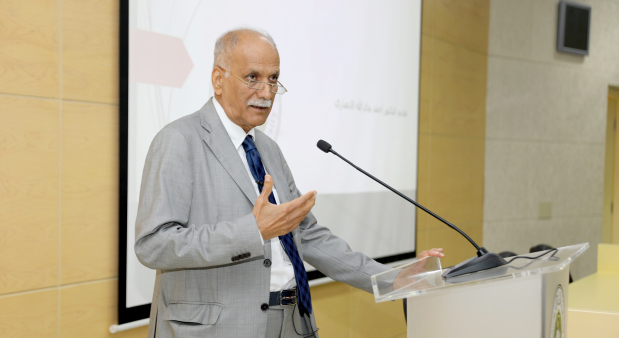Challenges faced by children with attention deficit hyperactivity disorder (ADHD) and the tailored classroom treatments to promote their learning and social development were highlighted at an event organised by a local university.
The workshop was conducted by the Arabian Gulf University (AGU) to enhance the skills of individuals working directly with those having the condition.
AGU psychiatry professor and child and adolescent psychiatry consultant Dr Ahmed Al Ansari outlined the difficulties faced by these children, including problems with concentration, organisation, impulse control and maintaining focus over extended periods.

Dr Al Ansari giving the talk
He underpinned the importance of educating teachers and all concerned parties about ADHD to foster understanding and prevent the misinterpretation of certain behaviours as misbehaviour.
ADHD is a neurodevelopmental condition with symptoms of inattentiveness, hyperactivity and impulsivity and is the most common psychiatric disorder encountered in children’s outpatient clinics.
“Creating a suitable classroom environment for students with ADHD involves minimising distractions, such as seating them away from windows or doors, and positioning them close to the teacher for better guidance and supervision,” Dr Al Ansari said, stressing on the use of visual and auditory cues to facilitate smooth transitions between activities.
“Breaking down long tasks into shorter, interconnected steps and utilising visual schedules or picture cards to illustrate the daily routine can significantly help students with ADHD,” he added, highlighting the necessity of providing clear, step-by-step instructions along with repetition to ensure they fully understand expectations.
On time management, Dr Al Ansari said visual timers could enhance children’s awareness of time, while short breaks during lengthy activities help maintain focus and energy.
He underpinned positive reinforcement, suggesting immediate rewards such as stars, stickers or verbal praise to motivate desired behaviours, and the implementation of reinforcement schedules like star charts for consistency.
“Minor, harmless inappropriate behaviours can often be ignored, while clear, logical consequences should be applied without yelling or threats. A consistent and predictable routine can help children with ADHD feel secure and supported,” he added.
Dr Al Ansari also encouraged fostering positive peer relationships through co-operative play and teaching conflict resolution skills. He focused on the importance of collaboration with families and mental health professionals, noting that regular meetings with parents and psychologists were crucial to monitor progress, and external interventions, whether pharmacological or behavioural, may be necessary depending on each child’s needs.
More than 60 participants, including Education Ministry representatives, Interior Ministry community service personnel, and Bahrain ADHD Society members took part in the session entitled ‘Classroom Treatment for Children with ADHD’.
The workshop was organised by AGU Community Service, Consultation, Training and Continuing Education Centre.
According to a latest report by the World Health Organisation focused on the Eastern Mediterranean region, ADHD is one of the most common mental disorders and affects five to eight per cent of children, mostly boys, and often lasts into adulthood.
While the exact cause of the condition is unknown, it can be attributed to factors, including genetics, traumatic childhood experiences, premature birth and prenatal issues like smoking and using alcohol during pregnancy or even extreme stress.
The WHO report goes on to highlight that while ADHD cannot be ‘cured’ completely, with a good treatment plan, which includes medication, psychotherapy, and education and training for both the child and caretakers, the symptoms can be controlled, improving day-to-day functioning for the individual.
The GDN previously reported that young Bahraini boys were twice as likely as girls to have ADHD, according to ‘The National Prevalence of Attention Deficit Hyperactivity Disorder (ADHD) Symptoms and its Comorbidities Among Children in Bahrain’ study, co-conducted by the Health Ministry and AGU. A total of 450 Bahraini children between the ages of six and 12 were recruited for the study.
melissa@gdnmedia.bh


&uuid=(email))